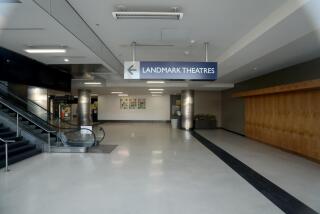Rehab Center Looks for New Home
- Share via
For 17 years, staffers at the Rainbow Recovery Center have gone about the painful task of repairing the lives of women ravaged by drugs, alcohol and mental illness. By all accounts, it has been a quiet, successful operation, located at Oxnard’s College Park.
But in the fast-growing city, the “Rainbow Ladies,” as employees and patients of the center are often called, are in the wrong place at the wrong time.
Last week, a divided City Council adopted a $20-million renovation for the 75-acre park that does not include the recovery center.
The two houses they rent will be used for a farm heritage museum. The women have to be out by January 2004, enough time, they say, to find another home.
“It was a sad night, but we’ve regrouped and we’re not going to let this get us down,” Executive Director Kathleen McQuillan said. “We’ve got each other. We’re just trusting in God, trying to be grateful for the things that we do have.”
The city’s plan calls for development of two dog parks, baseball and soccer fields, a lighted basketball area, a fenced skate park and a 26,000-square-foot community center with a gym.
The Rainbow house would be converted into a farm museum dedicated to the county’s agricultural history.
The women had vowed to fight to the bitter end, but conceded defeat after last week’s council vote.
“We’re going to have to apply for grants and write proposals until our hands fall off,” McQuillan said.
The center, which relies on a variety of grants and private donations, has no reserves to pay the $2 million it would likely cost to buy a new building that could accommodate up to 22 women, McQuillan said.
The city has pledged to help find a new place, and officials have said they will not formally agree to any museum plans until the center finds a new home.
But Mayor Manuel Lopez, who voted against the master plan for the park, has warned that finding a welcoming place will be difficult and costly.
“We’ll probably have to wind up building something for them, and it’s going to be very expensive,” he said.
In recent weeks, city officials began trying to find a new location, but they have already run into opposition from residents who lived near a proposed site in Oxnard’s historic district.
“That’s where you see the contradictions,” Rainbow counselor Jerry Smith said. “They want to see alcoholics and drug addicts off the streets, but they don’t want the place that treats them and keeps them off the street in their neighborhood.”
McQuillan said she hopes the city keeps its promise, but isn’t counting on it.
“We’re not going to let them off the hook,” she said. “But we’re not putting all our eggs in one basket.”
From the beginning, the Rainbow Ladies had a tough fight on their hands. For starters, they have no legal claim to the two old farmhouses.
Also, when the county transferred ownership of the park to the city in 2000, the deed stated that the property could only be used for “parks and recreation purposes,” officials said.
“They do great work, but when the recovery center was allowed to come to College Park, they had no intention of staying 17 years,” City Atty. Gary Gillig said.
“The Rainbow people, maybe not the ones that are there today, knew that the plan was for the park to be developed. They had a month-to-month lease.”
Even if the city and county changed the terms of their agreement to allow inclusion of the center, state grants to finance the estimated $20-million cost of renovating the park might be more difficult to obtain if there is a drug recovery center on park grounds, Gillig said.
“The state provides money to the city, but it’s always with strings attached,” he said. “It’s very difficult for me to believe that an alcohol-and-drug recovery center is appropriate use of a public park.”
But Nancy Williams, an assistant at the center, beams with pride at the houses she and the other women have rebuilt. “We do a service for this community,” Williams said. “We’re saving lives here; we’re reuniting families.”
Oxnard officials do not deny this. They have praised the Rainbow Ladies for their hard work and say they recognize the city needs their services. But, the officials add, not at a park.
McQuillan and other counselors have tried not to mention the controversy to the women they help. But recovering addicts such as Robin Olson, 35, know their place of refuge might soon be in someone else’s hands.
“They break you up and build you up and get you rooted for real life here,” she said. “There’s been a lot of tears shed here throughout the years, and it’s just wrong to have to go.”
Speaking through her own tears, McQuillan tries to stay optimistic. “Moving day will be sad, but we’ll go on. And wherever we go, we’ll make that our home, and we’ll help women, and we’ll continue to do our work,” she said.
“The truth is,” she said, “that anything can happen in a year, honey.”
More to Read
Sign up for Essential California
The most important California stories and recommendations in your inbox every morning.
You may occasionally receive promotional content from the Los Angeles Times.













